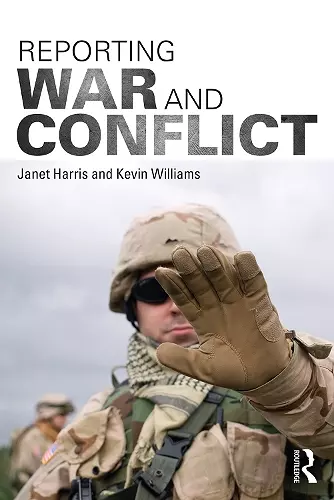Reporting War and Conflict
Janet Harris author Kevin Williams author
Format:Paperback
Publisher:Taylor & Francis Ltd
Published:11th Sep '18
Currently unavailable, and unfortunately no date known when it will be back
This paperback is available in another edition too:
- Hardback£145.00(9780415743679)

Reporting War and Conflict brings together history, theory and practice to explore the issues and obstacles involved in the reporting of contemporary war and conflict. The book examines the radical changes taking place in the working practices and day-to-day routines of war journalists, arguing that managing risk has become central to modern war correspondence. How individual reporters and news organisations organise their coverage of war and conflict is increasingly shaped by a variety of personal, professional and institutional risks.
The book provides an historical and theoretical context to risk culture and the work of war correspondents, paying particular attention to the changing nature of technology, organisational structures and the role of witnessing. The conflicts in Iraq, Afghanistan and Syria are examined to highlight how risk and the calculations of risk vary according to the type of conflict. The focus is on the relationship between propaganda, censorship, the sourcing of information and the challenges of reporting war in the digital world. The authors then move on to discuss the arguments around risk in relation to gender and war reporting and the coverage of death on the battlefield.
Reporting War and Conflict is a guide to the contemporary changes in warfare and the media environment that have influenced war reporting. It offers students and researchers in journalism and media studies an invaluable overview of the life of a modern war correspondent.
Speaking personally, the book would work nicely for our MA provision in journalism, where these issues receive careful attention. It may well serve as required reading on our war and conflict reporting unit, and is certain to be strongly recommended as supplementary reading on further units. – Professor Stuart Allan, Bournemouth University, UK
One thing I would suggest would be particular attention to the differences in war reporting by platform—the special challenges and disadvantages, as well as advantages, to these platforms. This should be relatively easy to include, given Prof. William’s background in print, and Harris’s expertise in broadcasting. – Professor Linda Steiner, University of Maryland, USA
The authors inspire confidence. Williams has an impressive track record, including a very good book on the history of British newspapers that he published with Routledge and another book in progress on war correspondence that this proposal grew out of. Harris has expertise in television journalism and is also a seasoned teacher. The two authors appear to complement each other in a productive way. – Professor John Nerone, University of Illinois, USA
I’d recommend the authors be more forthright in how they are conceptualising ‘risk’ and how this analysis explicitly underpins the organisation and content of the book [...] the chapter on reporting disasters seems to be somewhat out of kilter with the rest of the book [...]I think that their assessment is broadly correct and such a book would do well given the topic and the reputation of Prof. Williams. – John Steel, Sheffield University, UK
ISBN: 9780415743785
Dimensions: unknown
Weight: 348g
218 pages